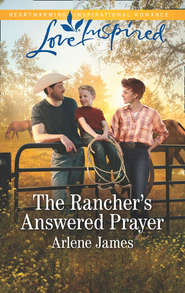По всем вопросам обращайтесь на: info@litportal.ru
(©) 2003-2024.
✖
His Ideal Match
Автор
Год написания книги
2019
Настройки чтения
Размер шрифта
Высота строк
Поля
“You weren’t going to eat it!”
Arriving on the scene, Phillip quickly intervened. “There’s plenty for everyone. No need to argue.”
The older boy whipped around, snarling, “It ain’t none of your business.”
His mother gasped. “Nathan Alexander Hopper,” she rebuked firmly. “You apologize this instant.”
Sullenly, the boy dropped his head, but after a moment he muttered, “Sorry.”
“I expect you to look after your brother and sister, not misbehave,” Carissa went on. “You know I depend on you.”
“Yes, ma’am.”
“And, Tucker, you mind your manners,” she instructed the younger boy.
“Yes, Mama.”
“Go now, both of you.”
After some grumbling, the two boys reluctantly started back down the hallway toward the sunroom. Carissa gave Phillip an exasperated look, as if he were somehow to blame, and spun sharply on one heel.
“Now, wait a minute,” he began, piqued.
“I’m sorry,” she snapped as he fell into step beside her. “It’s just that I have to work.”
“And that,” he said, as they reached the door, “makes me the bad guy?”
“No,” she answered drily, drawing out the single syllable even as she reached for the doorknob.
“Great,” Phillip said, putting up an arm to block her way. “Then maybe you’ll tell me what sort of work do you do.”
“Telemarketing,” she answered succinctly, folding her arms but refusing to look at him.
Phillip waited. She glanced up and huffed.
“My husband was a software engineer. He taught me everything he knew. He believed that good computer skills would ensure anyone a job. Unfortunately, in a lousy economy, without the diploma to back up those skills, no one will give me the time of day, even if I can write code better than anyone, which is why I sell tech support over the telephone rather than perform it.”
“So you’re good with computers, then,” Phillip said.
She tossed her head, fixing him with a narrow stare. “If by ‘good’ you mean I can tear down a computer to its most basic elements, fix any problem, put it back together again and write the software that operates it, then yes, I’m good with computers.” She parked her hands at her hips. “Now, what about you?”
“Oh,” he answered cheerfully, “I can turn on a computer, click a mouse, even type, if you’re not in a hurry.”
One corner of her mouth curled in a reluctant smile. “I mean, what do you do for a living?”
“Ah. Nothing, at the moment. I used to climb mountains, but I am, as they say, between jobs.”
“And I am trying not to be,” she said pointedly.
He dropped his arm, opened the door and stepped out of the way. She swept out onto the redbrick stoop and went quickly down the steps. He had closed the door behind her before it occurred to him that he hadn’t seen her vehicle parked beneath the porte cochere.
Suspecting that Hilda had told her not to park there for fear of blocking his car, he hurried through the house to the front door, stepping out onto the deep front porch in time to see Carissa Hopper climb into a battered little minivan with a missing rear hubcap and rusty passenger door handle. She drove away without so much as a wave of farewell. He wandered back into the foyer and leaned against the curled banister at the foot of the marble staircase, thinking about what she’d told him. The sound of a distant crash had him breaking into a run as a plaintive cry rose from the vicinity of the sunroom. It would only be the first of many.
Over the next two hours, Nathan and Tucker would manage to knock over a table, two chairs and a potted plant the size of a grown man. After the first altercation, Phillip decided to pitch in with the kids. Otherwise, he feared that no one would get lunch. Hilda’s husband, Chester, his aunts’ houseman, had driven Aunt Hypatia—or Auntie H—into town. Kent, Aunt Odelia’s husband, had gone down to his pharmacy to help out his young partner, while Odelia—Auntie Od to her adoring nieces and nephews—was taking a “spa day” in their suite, and Aunt Magnolia—affectionately known as Mags—was puttering around in the flower beds, as usual. If Hilda was going to get into the kitchen, Phillip had no choice but to watch over the scamps.
The boys kept him so busy that he didn’t realize Grace was missing until they did.
What could he do then but take them to look for her?
* * *
Humming to herself, Odelia Chatam Monroe swanned through the lovely mauve-and-cream sitting room of the suite that she shared with Kent, her husband of almost a year, and on into the purple bedroom, where the silk bed hangings, drapes and spread provided an appropriately romantic theme. They’d waited fifty years to marry, and they meant to enjoy every moment left to them. Pausing beside the antique Queen Anne dresser, she twitched a few gladiolus blossoms in a tall crystal vase into perfect position, before continuing into the enormous fuchsia-and-yellow bathroom to remove the cold cream from her face. After tossing aside the cucumber slices that she’d placed over her eyes, she next applied a judicious layer of makeup on her face. Finally, she removed the curlers from her thick, white hair and combed it out.
True, she was no girl, but Kent thought her beautiful. How she adored him. She took a moment to thank God for blessing her with such a husband in the twilight of her long, happy life before venturing into her closet, her favorite room in the whole house.
She noticed that she’d accidentally left the light on, but the crystal chandelier gave her such pleasure that she didn’t dwell on it. Of the many material gifts that Kent had given her—this gorgeous suite, the ostentatious ring on her finger, the pool in the backyard, to name a few—the closet was her favorite, for he’d had the walls painted in color-coded stripes so that her eclectic wardrobe could be stored in a somewhat orderly fashion. She did so love clothes. Giggling, she wondered what she ought to wear for lunch. Wouldn’t a gladiolus theme be fun?
An answering giggle surprised her. Odelia considered the possibility of an echo, but common sense—oh, yes, she did have some, no matter what others might say—told her that could not be so. For one thing, the racks were stuffed with clothing. For another, the room simply wasn’t large enough. That meant she must not be alone.
Looking around, she said brightly, “Hello?”
To her surprise, a little head wreathed in the aqua chiffon of one of her favorite skirts popped out from a row of dresses. “Hello.”
For a long moment, Odelia could do nothing but stare. The little one clomped into view, wearing a pale green knit short set, as well as a pair of Odelia’s pumps over her own canvas shoes and anklets. At second glance, she also wore other bits and pieces of Odelia’s wardrobe, including a gold belt worn sash-style over one shoulder and a feathered boa.
“You got snappers on your ears,” the little one said.
“Snappers?”
“Turdles. Snappers turdles.”
Odelia touched her earlobes, feeling her earrings. They had seemed appropriate after her gardening-mad sister had complained at breakfast that a box turtle had been snacking on her rhododendrons. “You mean, snapping turtles, I think.” She had forgotten about them.
“Yep. You got ’em on your ears.”
“So I do, and you have on my things.” Odelia recognized a scarf and a pair of old gloves that she’d given Hilda earlier. Puzzle pieces tumbled into place. “Ah. You’re Hilda’s great-niece.”
The girl nodded. “We’re playing dress-up.”
Odelia smiled, recognizing a kindred spirit. “What’s your name, child?”
“Grace.”
“Grace is not a full name,” Odelia admonished gently. “For instance, I am Odelia Mae Chatam Monroe.” Frowning, she pressed a finger against the cleft in her chin. “Or should that be Mrs. Kent Monroe? Mrs. Odelia Monroe?” Hypatia would know. Odelia waved a hand. “You may call me Miss Odelia. Now then, your name? Your full name, if you please.”
“Grace Amanda Hopper,” the imp said, wobbling in the shoes.
“So, you like to play dress-up, do you, Grace Amanda?”











